Safe Household Cleaning is reader-supported. All reviews are independent and any products reviewed are purchased by the site owner. To help fund this model, some of the links on the site are affiliate links. If you decide to make a purchase from one of these links, this site will receive some commission. At no cost to you. It helps keeps this place running. Learn more
| Method Smarty Dish Dishwasher Tabs | |
|---|---|
| Review Score |  |
| Ewg Rated | C |
| Ingredients | Sodium Carbonate Sodium Percarbonate Organic Acid Salts Sodium Disilicate Sodium Metasilicate Sodium Citrate Tetrasodium Iminodisuccinate Sodium Polyaspartate Poloxamer 181 Organic Acids Alginic Acid Fragrance Protease Amylase Tetraacetylethylenediamine Hydroxypropyl Methylcellulose |
Method Smarty Dish Dishwasher Tabs is a bio based dishwashing detergent that does an excellent job of cleaning most domestic dishes. The company have a commitment to clean living and mother nature, which makes the sheer quantity of synthetic ingredients quite surprising. While this isn't necessarily a bad thing, there is a chance that these ingredients are contaminated with much nastier ingredients during manufacturing. What is more surprising is the company haven't provided full ingredient disclosure. What is an Organic Acid for example? These tabs are still a very decent performer and a vast improvement over 99% of supermarket dishwasher tabs. They could have been outstanding. | |

Method’s Smarty Dish dishwasher tabs purport to be an eco-friendly, fragrance-free, efficient kitchen cleaning product that “are a delightful addition to our modern kitchens”.
In a world where we consumers are bombarded with plasticizers from packaged foods, exposed to toxic metals in our seafood, and continuously inhaling noxious car exhaust fumes, Method’s products are a breath of fresh air (literally).
Although green products like Smart Dish make you feel like a responsible consumer, how well do they really work?
Who are Method?
Method, the company behind the product, is quite unique among its contemporaries. They actually disclose all their ingredients, use natural and biodegradable sources, and put energy and resources into designing and executing eco-friendly production, transport and distribution. This puts them ahead of 99% of their contemporaries.
For a company to be proactive and put guidelines in place for cutting down on plastic and chemical use for the good of the planet and human health? That speaks to the values of an organization and their vision for our future. They are a company who understand the problems with their industry and are actively trying to do something about it.
Besides dishwashing reagents, Method offers hand soaps, body wash and soap, laundry detergent, and all-purpose cleaners and we’ve already looked at their dish soap. As a bonus, these products are conveniently found at local pharmacies and home suppliers such as CVS, Walgreens, BJ’s, Staples and Home Depot, or for order through online companies Amazon.
This is definitely a company committed to a sustainable future, but at the end of the day are their products reliable? Should we really be spending the extra few bucks for their product versus a generic dishwasher detergent?
The dishwasher tabs are densely organized into 20 tabs per pack (12.75 ounces total weight), white in color, and compactly situated in a plastic bag that was designed to need a minimum amount of plastic. Other dishwasher tabs we have used before come in little plastic tubs – a complete waste of plastic, now that we think about it. Most of the 20 tabs were whole, although one tab was broken into two fragments.
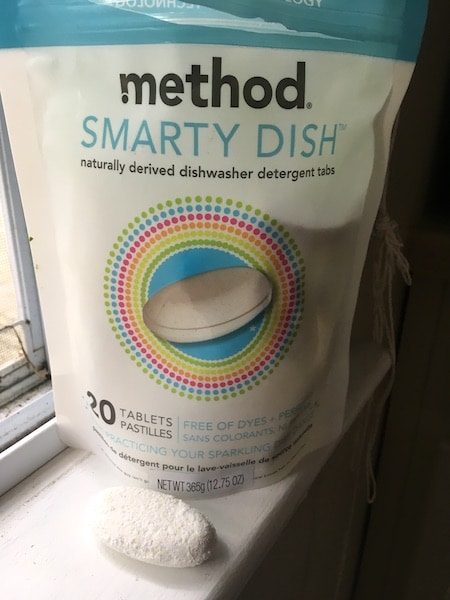
The company theme is aptly labeled on the packaging:
“Non-toxic mineral-based powergreen technology”
As indicated on the packaging, these tabs are free of dyes and perfumes.
In a nutshell:
- No odors
- No dyes
- Plant-based
- Biodegradable
In terms of instructions, it’s as simple as possible: pop a tablet into the dispenser.
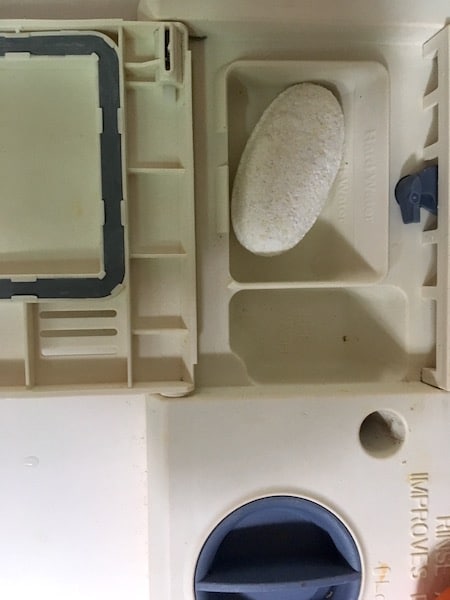
But how well can it clean?
Prior to the test run, kitchenware had been sitting for 4 days with a thick film of grease, cheese, and tomato sauce. (It smelled horrendous – think sweaty socks and rotten eggs in a 100 degree car). My usual dishwasher soap does an *ok* job at removing food, although there is typically an annoying amount of residue remaining after the runs.
After the Smarty dishwasher trial, my plates are odorless, spotless, and sparkling for a change. There is a 95% reduction in food particles. That cutting board hasn’t been properly white since I first started using it, but after the Smarty run, those stains are gone. You can see an assortment of kitchenware before and after the Smarty run here.
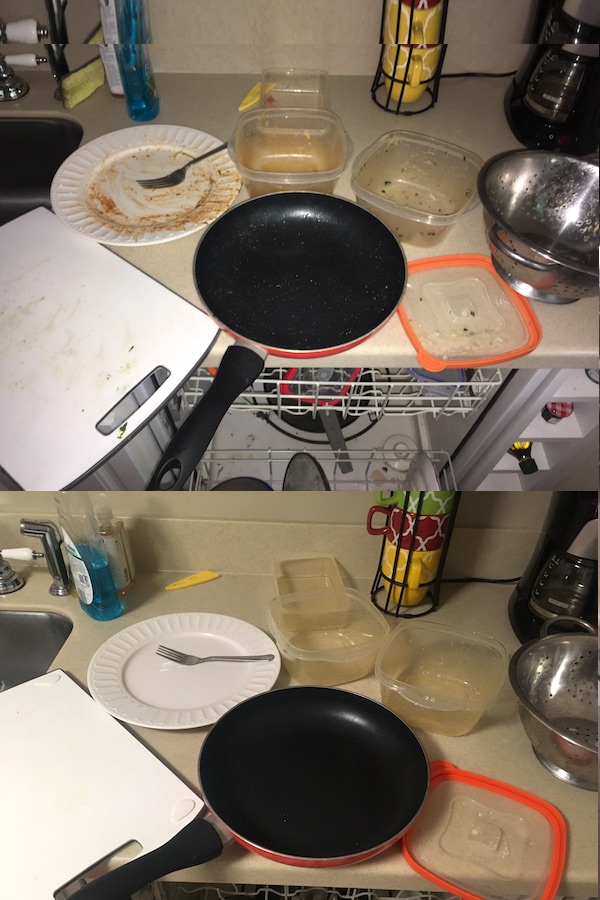
They clean well. Very well. What are these tablets made of?
Now which chemicals exactly did it use to achieve such sparkling plates, and if not phosphate or bleach-based, how do they work?
Of the 14 ingredients listed on their product page, 12 are naturally derived from either plant or mineral origin.
I noticed the ordering of ingredients differ slightly between the packaging and what is listed on the product website – its always worth checking the packaging as this can happen.
The first ingredient listed on the packaging, sodium carbonate, is mineral-based and widely used for even washing, softening water, and cutting through grease.
Sodium silicates, also derived from naturally occurring compounds, are used for preventing mineral deposits during the cleaning process.
Although perfectly safe in detergents, both can be dangerous to breathe in or swallow, so caution should be exercised when using this product – or any detergent for that matter – around children. (We need not remind you of the absurdly dangerous #TidePod challenge that circulated around social media earlier this year.) While we’re at it, I’d recommend wearing gloves when handling these if you have sensitive skin. There are a number of known contact allergens in these tabs.
Sodium polyasparate is a synthesized derivative of the amino acid aspartic acid, which builds many essential proteins in our cells. It’s an eco-friendly alternative to sodium polyacrylate, a synthetic polymer used in baby diapers and agriculture. Both bind to metal ions and allow surfactants to do their job more effectively, although only the former biodegrades.
This is a bio cleaner as the company have added two cleaning enzymes; protease and amylase. Both are well-characterized enzymes found in all domains of life (archaea, bacteria, and multicellular organisms) that break apart proteins and carbohydrates respectively. And as icing on the vegan cake, alginic acid, a biodegradable sugar biopolymer derived from brown algae, is used to hold the tablets together.
While this is all good, it is surprising to see a relatively high number of synthetic ingredients on this list. While this isn’t necessarily a bad thing there is a risk of these synthetic ingredients e.g. Poloxamer 181 being contaminated with 1,4 Dioxane during manufacturing.
What’s even more surprising is the lack of full disclosure in the ingredients. To have unspecified Organic Acids and Organic Acid salts isn’t helpful. They could mean virtually anything. Some of the strongest acids in existence are organic acid. While I’m sure the company haven’t gone to those extremes, it is peculiar and disingenuous that they haven’t disclosed everything.
It is worth notning that the company they don’t test on animals (cruelty-free and PETA approved) or use ingredients obtained from animals. Their trucks are powered by biodiesel and offices are run on renewable energy credits, and all bottles are made with recycled plastic. And according to their website, their newest factory will be run entirely on solar and wind energy!
In summary
Method Smarty Dish Dishwasher Tabs is a bio-based dishwashing detergent that does an excellent job of cleaning most domestic dishes.
The company have a commitment to clean living and mother nature, which makes the sheer quantity of synthetic ingredients quite surprising.
While this isn’t necessarily a bad thing, there is a chance that these ingredients are contaminated with much nastier ingredients during manufacturing. What is more surprising is the company haven’t provided full ingredient disclosure. What is an Organic Acid for example?
So while these tablets are as good as we’ve seen for cleaning, its the lack of full disclosure that holds us back from giving this a full 5 star rating.
Almost amazing.
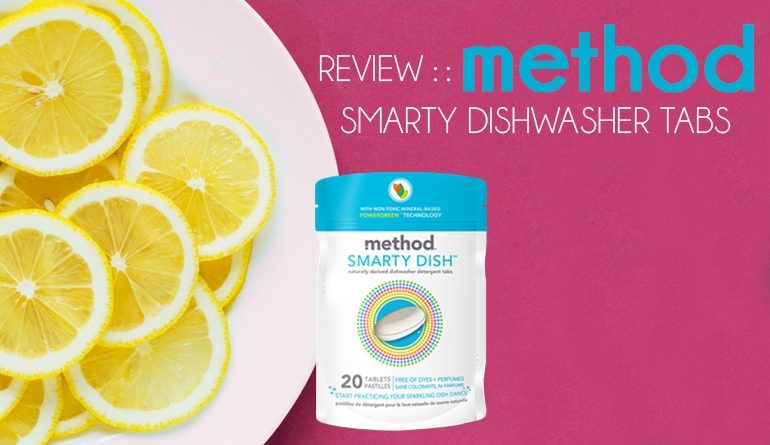
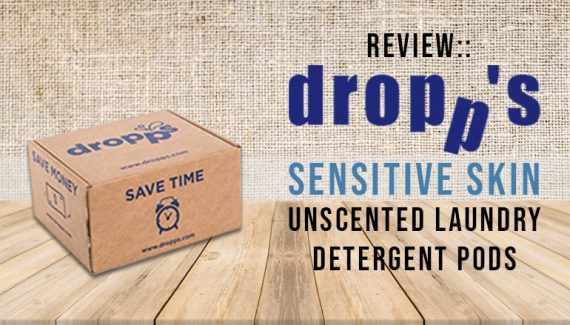
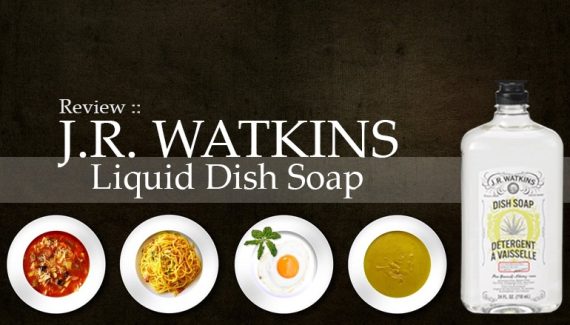
One Response
I can’t get on board with replacing plastic tubs with these resealable bags as a being a good thing. They may use less plastic but they are not recyclable. Surely the tub which can be recycled or even reused in the household is better than something binned after use? In the UK there is a hand-wash brand selling refills for hand wash I these plastic pouches and it seems a strange idea to make everyone think the pouches are better, even when they go in the bin after use!
I like method tho I have been skeptical about buying since they were taken over by sc johsom who do still test on animals.